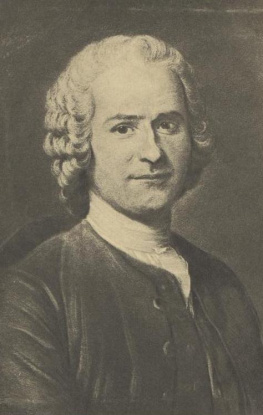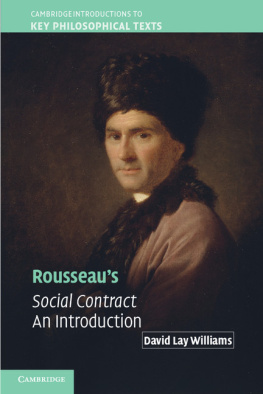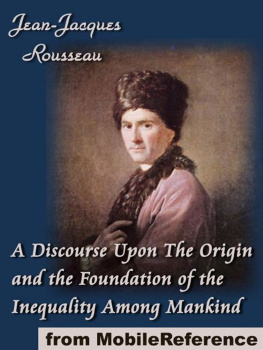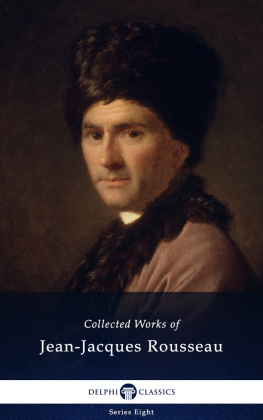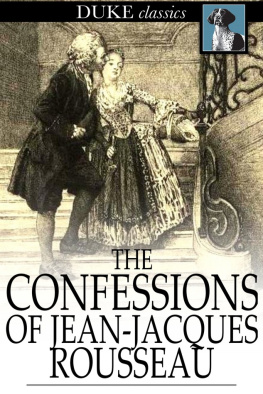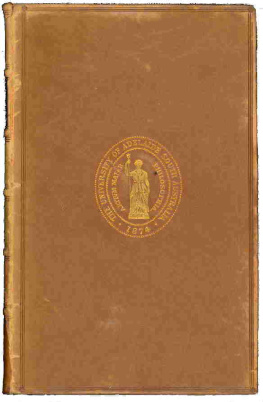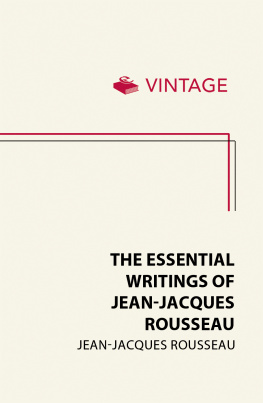Rousseau Jean-Jacques - The Confessions of Rousseau
Here you can read online Rousseau Jean-Jacques - The Confessions of Rousseau full text of the book (entire story) in english for free. Download pdf and epub, get meaning, cover and reviews about this ebook. genre: Science. Description of the work, (preface) as well as reviews are available. Best literature library LitArk.com created for fans of good reading and offers a wide selection of genres:
Romance novel
Science fiction
Adventure
Detective
Science
History
Home and family
Prose
Art
Politics
Computer
Non-fiction
Religion
Business
Children
Humor
Choose a favorite category and find really read worthwhile books. Enjoy immersion in the world of imagination, feel the emotions of the characters or learn something new for yourself, make an fascinating discovery.
- Book:The Confessions of Rousseau
- Author:
- Genre:
- Rating:3 / 5
- Favourites:Add to favourites
- Your mark:
- 60
- 1
- 2
- 3
- 4
- 5
The Confessions of Rousseau: summary, description and annotation
We offer to read an annotation, description, summary or preface (depends on what the author of the book "The Confessions of Rousseau" wrote himself). If you haven't found the necessary information about the book — write in the comments, we will try to find it.
Rousseau Jean-Jacques: author's other books
Who wrote The Confessions of Rousseau? Find out the surname, the name of the author of the book and a list of all author's works by series.
The Confessions of Rousseau — read online for free the complete book (whole text) full work
Below is the text of the book, divided by pages. System saving the place of the last page read, allows you to conveniently read the book "The Confessions of Rousseau" online for free, without having to search again every time where you left off. Put a bookmark, and you can go to the page where you finished reading at any time.
Font size:
Interval:
Bookmark:
The Project Gutenberg EBook of The Confessions of J. J. Rousseau, Complete
by Jean Jacques Rousseau
This eBook is for the use of anyone anywhere at no cost and with
almost no restrictions whatsoever. You may copy it, give it away or
re-use it under the terms of the Project Gutenberg License included
with this eBook or online at www.gutenberg.net
Title: The Confessions of J. J. Rousseau, Complete
Author: Jean Jacques Rousseau
Release Date: October 4, 2006 [EBook #3913]
Language: English
*** START OF THIS PROJECT GUTENBERG EBOOK CONFESSIONS ROUSSEAU ***
Produced by David Widger
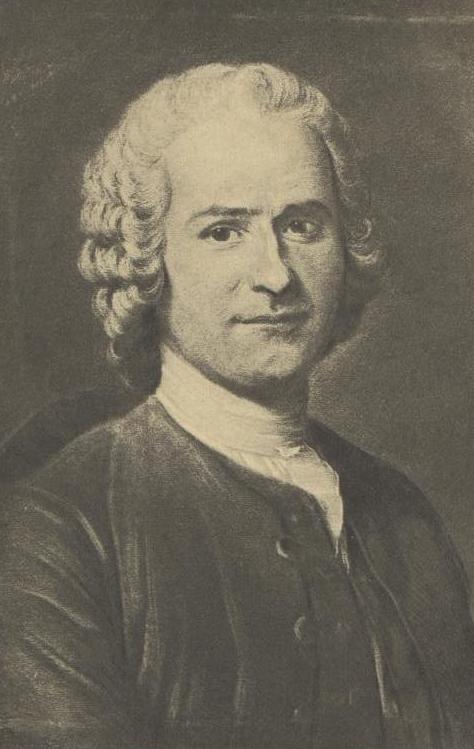

| Book I. Book II. Book III. Book IV. Book V. Book VI. | Book VII. Book VIII. Book IX. Book X. Book XI. Book XII. |
| Jean Jacques Rousseau | Painting by Maurice Q. de La Tour |
| The Stealing of The Apple | Etching by Maurice Leloir |
| In The Laboratory | Etching by Maurice Leloir |
| The Burnt Drugs | Etching by Maurice Leloir |
| Rousseau With Madame Dupin | Etching by Maurice Leloir |
| In The Garden of The Hermitage | Etching by Maurice Leloir |
| Jean Jacques Quits The Hermitage | Etching by Maurice Leloir |
| Visit to The Castle of Mont Louis | Etching by Maurice Leloir |
| Jean Jacques and Mdlle. De Boufflers | Etching by Maurice Leloir |
| Separation of Rousseau and Therese | Etching by Maurice Leloir |
Among the notable books of later times-we may say, without exaggeration, of all timemust be reckoned The Confessions of Jean Jacques Rousseau. It deals with leading personages and transactions of a momentous epoch, when absolutism and feudalism were rallying for their last struggle against the modern spirit, chiefly represented by Voltaire, the Encyclopedists, and Rousseau himselfa struggle to which, after many fierce intestine quarrels and sanguinary wars throughout Europe and America, has succeeded the prevalence of those more tolerant and rational principles by which the statesmen of our own day are actuated.
On these matters, however, it is not our province to enlarge; nor is it necessary to furnish any detailed account of our author's political, religious, and philosophic axioms and systems, his paradoxes and his errors in logic: these have been so long and so exhaustively disputed over by contending factions that little is left for even the most assiduous gleaner in the field. The inquirer will find, in Mr. John Money's excellent work, the opinions of Rousseau reviewed succinctly and impartially. The 'Contrat Social', the 'Lattres Ecrites de la Montagne', and other treatises that once aroused fierce controversy, may therefore be left in the repose to which they have long been consigned, so far as the mass of mankind is concerned, though they must always form part of the library of the politician and the historian. One prefers to turn to the man Rousseau as he paints himself in the remarkable work before us.
That the task which he undertook in offering to show himselfas Persius puts it'Intus et in cute', to posterity, exceeded his powers, is a trite criticism; like all human enterprises, his purpose was only imperfectly fulfilled; but this circumstance in no way lessens the attractive qualities of his book, not only for the student of history or psychology, but for the intelligent man of the world. Its startling frankness gives it a peculiar interest wanting in most other autobiographies.
Many censors have elected to sit in judgment on the failings of this strangely constituted being, and some have pronounced upon him very severe sentences. Let it be said once for all that his faults and mistakes were generally due to causes over which he had but little control, such as a defective education, a too acute sensitiveness, which engendered suspicion of his fellows, irresolution, an overstrained sense of honour and independence, and an obstinate refusal to take advice from those who really wished to befriend him; nor should it be forgotten that he was afflicted during the greater part of his life with an incurable disease.
Lord Byron had a soul near akin to Rousseau's, whose writings naturally made a deep impression on the poet's mind, and probably had an influence on his conduct and modes of thought: In some stanzas of 'Childe Harold' this sympathy is expressed with truth and power; especially is the weakness of the Swiss philosopher's character summed up in the following admirable lines:
"Here the self-torturing sophist, wild Rousseau,
The apostle of affliction, he who threw
Enchantment over passion, and from woe
Wrung overwhelming eloquence, first drew
The breath which made him wretched; yet he knew
How to make madness beautiful, and cast
O'er erring deeds and thoughts a heavenly hue
Of words, like sunbeams, dazzling as they passed
The eyes, which o'er them shed tears feelingly and fast.
"His life was one long war with self-sought foes,
Or friends by him self-banished; for his mind
Had grown Suspicion's sanctuary, and chose,
For its own cruel sacrifice, the kind,
'Gainst whom he raged with fury strange and blind.
But he was frenzied,-wherefore, who may know?
Since cause might be which skill could never find;
But he was frenzied by disease or woe
To that worst pitch of all, which wears a reasoning show."
One would rather, however, dwell on the brighter hues of the picture than on its shadows and blemishes; let us not, then, seek to "draw his frailties from their dread abode." His greatest fault was his renunciation of a father's duty to his offspring; but this crime he expiated by a long and bitter repentance. We cannot, perhaps, very readily excuse the way in which he has occasionally treated the memory of his mistress and benefactress. That he loved Madame de Warenshis 'Mamma'deeply and sincerely is undeniable, notwithstanding which he now and then dwells on her improvidence and her feminine indiscretions with an unnecessary and unbecoming lack of delicacy that has an unpleasant effect on the reader, almost seeming to justify the remark of one of his most lenient criticsthat, after all, Rousseau had the soul of a lackey. He possessed, however, many amiable and charming qualities, both as a man and a writer, which were evident to those amidst whom he lived, and will be equally so to the unprejudiced reader of the Confessions. He had a profound sense of justice and a real desire for the improvement and advancement of the race. Owing to these excellences he was beloved to the last even by persons whom he tried to repel, looking upon them as members of a band of conspirators, bent upon destroying his domestic peace and depriving him of the means of subsistence.
Those of his writings that are most nearly allied in tone and spirit to the 'Confessions' are the 'Reveries d'un Promeneur Solitaire' and 'La Nouvelle Heloise'. His correspondence throws much light on his life and character, as do also parts of 'Emile'. It is not easy in our day to realize the effect wrought upon the public mind by the advent of 'La Nouvelle Heloise'. Julie and Saint-Preux became names to conjure with; their ill-starred amours were everywhere sighed and wept over by the tender-hearted fair; indeed, in composing this work, Rousseau may be said to have done for Switzerland what the author of the Waverly Novels did for Scotland, turning its mountains, lakes and islands, formerly regarded with aversion, into a fairyland peopled with creatures whose joys and sorrows appealed irresistibly to every breast. Shortly after its publication began to flow that stream of tourists and travellers which tends to make Switzerland not only more celebrated but more opulent every year. It, is one of the few romances written in the epistolary form that do not oppress the reader with a sense of languor and unreality; for its creator poured into its pages a tide of passion unknown to his frigid and stilted predecessors, and dared to depict Nature as she really is, not as she was misrepresented by the modish authors and artists of the age. Some persons seem shy of owning an acquaintance with this work; indeed, it has been made the butt of ridicule by the disciples of a decadent school. Its faults and its beauties are on the surface; Rousseau's own estimate is freely expressed at the beginning of the eleventh book of the Confessions and elsewhere. It might be wished that the preface had been differently conceived and worded; for the assertion made therein that the book may prove dangerous has caused it to be inscribed on a sort of Index, and good folk who never read a line of it blush at its name. Its "sensibility," too, is a little overdone, and has supplied the wits with opportunities for satire; for example, Canning, in his 'New Morality':
Font size:
Interval:
Bookmark:
Similar books «The Confessions of Rousseau»
Look at similar books to The Confessions of Rousseau. We have selected literature similar in name and meaning in the hope of providing readers with more options to find new, interesting, not yet read works.
Discussion, reviews of the book The Confessions of Rousseau and just readers' own opinions. Leave your comments, write what you think about the work, its meaning or the main characters. Specify what exactly you liked and what you didn't like, and why you think so.

